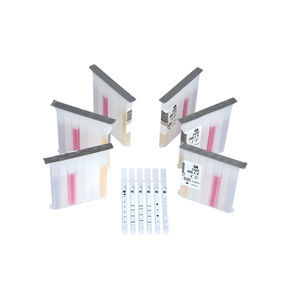
Autoimmune disease test kit Anti-Gangliosid Dotfor neurological diseasesIgGIgM
Add to favorites
Compare this product
Characteristics
- Applications
- for autoimmune diseases, for neurological diseases
- Tested parameter
- IgG, IgM
- Sample type
- serum
- Analysis mode
- line immunoassay
- Result display time
190 min
Description
The Anti-Gangliosid Dot is a qualitative line immunoassay for the determination of IgG or IgM antibodies against gangliosides in human serum. The Anti-Gangliosid Dot is intended as an aid in the diagnosis of peripheral neurological disorders in conjunction with other clinical and laboratory findings. The immunoassay is designed for manual professional in vitro diagnostic use.
Diagnostic Relevance
Clinical symptoms associated with inflammatory neuropathies of the peripheral nervous system range from mild signs like slight weariness, inexplicable indisposition to complicated cases such as functional deficiency like respiratory paralysis, cardiac arrest and neuromuscular disorders. Gangliosides, acid glycolipids containing a lipid (ceramide), oligosaccharide and sialic acid, are major components of cell membranes and found especially in the central and peripheral nervous system. Autoantibodies to gangliosides are detected in patients suffering from disorders of the peripheral nervous system.
Infection with Campylobacter jejuni, Cytomegalovirus, Epstein-Barr virus, Mycoplasma pneumoniae or Haemophilus influenza are risk factors for inflammatory neuropathies: Antibodies to ganglioside structures of these microorganisms may cross-react with gangliosides of the myelin sheath or neurofibre, leading to activation of inflammation processes with subsequent demyelination.
Description - Line immunoassay for the qualitative determination of IgG and / or IgM antibodies against gangliosides in human serum
Format - Test strips coated with GM1, GM2, GM3, GM4, GD1a, GD1b, GD2, GD3, GT1a, GT1b, GQ1b and sulfatides
Sample volume - 10 µL serum
No. of determinations - 24 x 12
Catalogs
No catalogs are available for this product.
See all of MEDIPAN GmbH‘s catalogsRelated Searches
- Assay kit
- Blood assay kit
- Serum assay kit
- Immunoassay assay kit
- Plasma assay kit
- Infectious disease detection kit
- Rapid lateral flow test
- Immunoassay rapid diagnostic test
- Clinical assay kit
- Lateral flow test kit
- ELISA assay kit
- IgG test kit
- Strip detection kit
- Laboratory detection kit
- Bacteria rapid diagnostic test
- Rapid feces test
- Nasopharyngeal assay kit
- Antibody assay kit
- Feces test kit
- Immunofluorescence test kit
*Prices are pre-tax. They exclude delivery charges and customs duties and do not include additional charges for installation or activation options. Prices are indicative only and may vary by country, with changes to the cost of raw materials and exchange rates.













